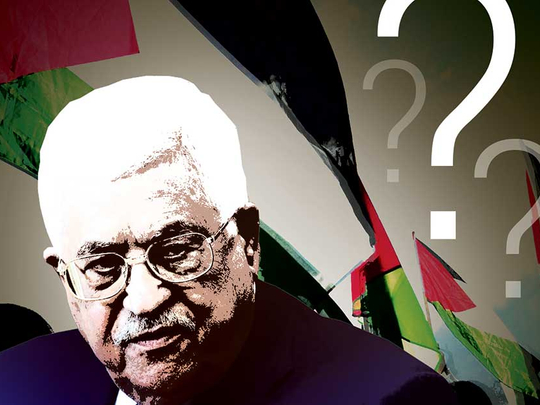
What are Palestinian National Authority (PNA) President Mahmoud Abbas’ options following United States President Donald Trump’s recognition of occupied Jerusalem as Israel’s capital and decision to relocate the US embassy there? He is already under pressure from the White House to remain engaged in US efforts to re-launch peace talks with Israel. He has been warned of grave consequences if he refuses to meet with Vice-President Mike Pence, who is expected to be in the region soon. But Abbas knows that if he caves in to pressure now he risks dampening the international momentum, not to mention Arab and Muslim fury, which the Trump declaration has triggered. By submitting to US demands he would appear to be succumbing to the unilateral and illegal US move. Far more important he would be distancing himself from his own people who are in a state of rage.
He has already stated that the US has disqualified itself as a peace mediator. And he is right. Almost a quarter of century had lapsed since the Palestinian leadership bowed to an exclusive sponsorship by the US of what turned out to be an impotent peace process. During that period, Israel unashamedly violated every agreement that the two sides had signed since the adoption of the Oslo Accords. On the ground successive Israeli governments accelerated the process of colonisation of West Bank territory while physically separating occupied East Jerusalem through a meticulous scheme of judaisation. In fact while the US paid lip service to the two-state solution, Israel was busy creating a new reality on the ground that made that goal unfeasible.
Under the present far-right Israeli government, the fate of the so-called final status issues has already been sealed: No partition of occupied Jerusalem, no right of return for refugees, no dismantling of colonies in the West Bank and no withdrawal from the Jordan Valley! The two-state option and the Oslo Accords are relics of the past for Israeli Prime Minister Benjamin Netanyahu and his ultranationalist coalition partners.
Trump’s declaration, unilateral and illegal as it is, does underline the bitter reality; one that Israel has created and is unwilling to reverse. Why Abbas held to the US as mediator and to a peace process that had ceased to exist long time ago is intriguing? But the answer is simple: Alternative choices are difficult and risky.
But now that Trump has delivered a fatal blow to his own peace plan even before it was announced, Abbas must muster the courage to move on and adopt such alternatives.
He must push ahead with efforts to admit the state of Palestine into as many international organisations as possible. He must demand that the case of Palestine’s occupation revert to the United Nations, the international quartet and international forums. He must revive and restructure the Palestine Liberation Organisation (PLO) as the legitimate representative of the Palestinian people under which all Palestinian groups must meet. He must accelerate the process of reconciliation among various groups and end the rift between Hamas and Fatah. He must terminate all forms of coordination between the PNA and Israeli occupation. He must deliver an ultimatum that the PNA will dismantle itself within a short timeframe unless the UN adopts a resolution that puts the West Bank under international protection. He must allow his own people to maintain all forms of peaceful protests against occupation that could culminate in total civil disobedience. In addition, he must also declare that since the two-state option is dead, Palestinians would now demand to be part of one democratic secular state for all the inhabitants of historical Palestine.
All of these choices are difficult because no one knows what the final outcome would be. US and Israeli reactions will be extreme: Washington will withhold all financial aid to the PNA, which employs almost one third of Palestinians, while Israel would go as far as putting the Palestinian leadership under house arrest or worse. But Abbas must now assume a historical role if he and his people are to overcome US diplomatic pressure and Israeli onslaught. It is unfortunate that he can only count on symbolic Arab support. The recent crisis could not have come at a worse time for the Palestinians. The Arab world is roiling as a result of civil wars, inter-Arab rivalries and US political and economic domination of most capitals.
But the Palestinian leader cannot afford to be complacent and passive. This is the most critical if not existential challenge for his people’s just cause in many decades; one that could end with its de facto liquidation. While sacrifices will be made on the ground that the Palestinian leadership must be ready in engage in an unprecedented diplomatic offensive to derail sinister attempts to kill the legitimate aspiration of liberation and self-determination.
Osama Al Sharif is a journalist and political commentator based in Amman.










